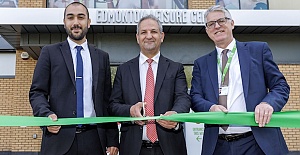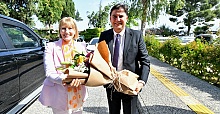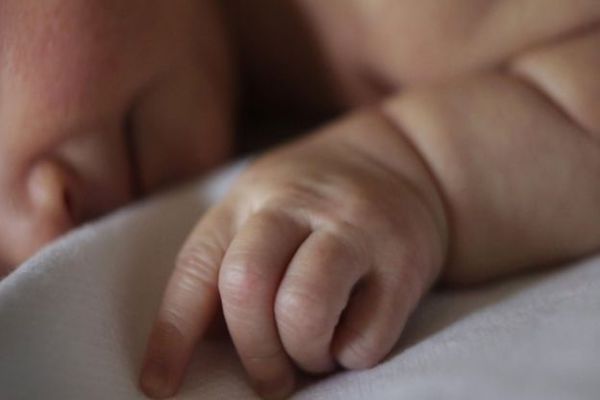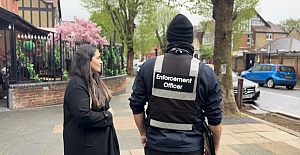Experts say they are concerned that guidance on how to minimise the risks is not being passed on. Dawn Barclay, from Forfar, recalls the first few weeks of her baby Fern's life. It was 2014, and Dawn says lying next to Fern was the only way her daughter would sleep. "I'd do it the safest way possible. I would remove the pillows, she would be on her back, with my hand on her chest. "No-one else - husband or other child - in the bed with us. To have her close was just the most natural thing in the world."
'Lying on the couch'
Tragically, Dawn took a nap one morning with her eight-week-old daughter on the sofa. She woke to find Fern had stopped breathing. "She woke up and had a feed, and we both had fallen back asleep, but we were lying on the couch." Dawn cried for help as soon as she knew something was wrong. "The fear that I had done something to her was one of the first things to go through my mind, I didn't understand what else was going on apart from the fact that I thought I'd killed my baby.

"I remember lifting her up and just running through to Andy, and screaming that she was gone." Dawn said her husband started doing CPR. "I thought he'd managed to bring her back. He managed to get the colour to come back in her cheeks," she says. But Andy was unable to resuscitate Fern. "I just remember falling to the ground and just screaming," Dawn says. Nine months later, following a coroner's report, it was discovered that Fern had suffered damage on her brain from birth that might have stopped her breathing. Her death certificate was changed from inconclusive to "sudden unexpected death in infancy associated with co-sleeping" - a ruling Dawn still believes is unfair.


 Prime Minister Keir Starmer's 2025 Easter message
Prime Minister Keir Starmer's 2025 Easter message After Nesil Caliskan a by-election will be held in Jubilee ward in Enfield
After Nesil Caliskan a by-election will be held in Jubilee ward in Enfield Publishing the analysis, Labour’s Cllr Ergin Erbil said Everybody in Enfield deserves basic rights
Publishing the analysis, Labour’s Cllr Ergin Erbil said Everybody in Enfield deserves basic rights Gaza-Israel conflict Statement from Cllr Ergin Erbil, Leader of Enfield Council
Gaza-Israel conflict Statement from Cllr Ergin Erbil, Leader of Enfield Council UK AMBASSADOR TO TURKEY VISITS FETHIYE
UK AMBASSADOR TO TURKEY VISITS FETHIYE Journalists from Europe held the Turkish Media Workshop in Skopje
Journalists from Europe held the Turkish Media Workshop in Skopje The European Union called on Turkey to uphold democratic values
The European Union called on Turkey to uphold democratic values Turkish citizens in London said Rights, Law, Justice
Turkish citizens in London said Rights, Law, Justice The 'Prince of Paris' has impressed in his first EuroLeague season
The 'Prince of Paris' has impressed in his first EuroLeague season Saran Media And Euroleague Basketball Extend Media Rights Partnership for Four More Years
Saran Media And Euroleague Basketball Extend Media Rights Partnership for Four More Years Will Rangers be Jose Mourinho’s next victim?
Will Rangers be Jose Mourinho’s next victim? Jose Mourinho's Fenerbahce face Rangers on Thursday
Jose Mourinho's Fenerbahce face Rangers on Thursday Residents welcomed back to Edmonton Leisure Centre
Residents welcomed back to Edmonton Leisure Centre Barclays has become the biggest UK lender so far to cut mortgage rates
Barclays has become the biggest UK lender so far to cut mortgage rates THE SPRING STATEMENT EXPLAINED, UK ECONOMIC OUTLOOK AND GROWTH FORECASTS
THE SPRING STATEMENT EXPLAINED, UK ECONOMIC OUTLOOK AND GROWTH FORECASTS Launch of Made in Enfield gift shop to celebrate local artists and designers
Launch of Made in Enfield gift shop to celebrate local artists and designers
















